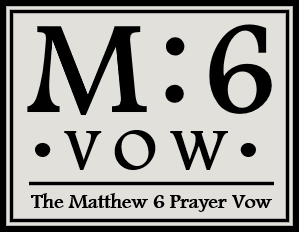The Matthew 6 Prayer Vow
What is the M:6 prayer vow?
This vow – based on Jesus’s teachings in Matthew 6:5-13 – is the seed of a prayer discipline. We vow to follow Jesus’s direct instruction on how he wishes his follower top pray.
The discipline involves the avowed commitment to use prayer as a two-way communication with God and to refrain from: attempting to tell God what we want him to do (“vending machine prayer”; “wishing well prayer”); from using “prayer” as a way to communicate with, or perform for, or influence in any way, other mortals. It is not an exercise in eloquence or a demonstration of religious knowledge.
Instead, the M:6 prayer will be a beseeching of his guidance. It will include gratitude for grace, it is asking for direction in character development. It will ask to understand His will – in order for us to accept it and shape our hears and actions in conformity to it. It is asking for forgiveness.
Rather than treating God like a consumer-culture-inspired Santa Claus, M:6 prayer instead treats God as our instructor.
Since “your Father knows what you need before you ask him,” it is your job to ask him what His will is and to listen for His answers and His instructions. We are to be shaped by Him so that we grow into conformity with His will. We are not to try to coax Him to be shaped by our will.
Here is the scriptural source for the vow.
Matthew 6: 5-13
“And when you pray, do not be like the hypocrites, for they love to pray standing in the synagogues and on the street corners to be seen by others. Truly I tell you, they have received their reward in full. But when you pray, go into your room, close the door and pray to your Father, who is unseen. Then your Father, who sees what is done in secret, will reward you. And when you pray, do not keep on babbling like pagans, for they think they will be heard because of their many words. Do not be like them, for your Father knows what you need before you ask him.
“This, then, is how you should pray:
“‘Our Father in heaven,
hallowed be your name,
your kingdom come,
your will be done,
on earth as it is in heaven.
Give us today our daily bread.
And forgive us our debts,
as we also have forgiven our debtors.
And lead us not into temptation,
but deliver us from the evil one.’”
***




Comments
Post a Comment